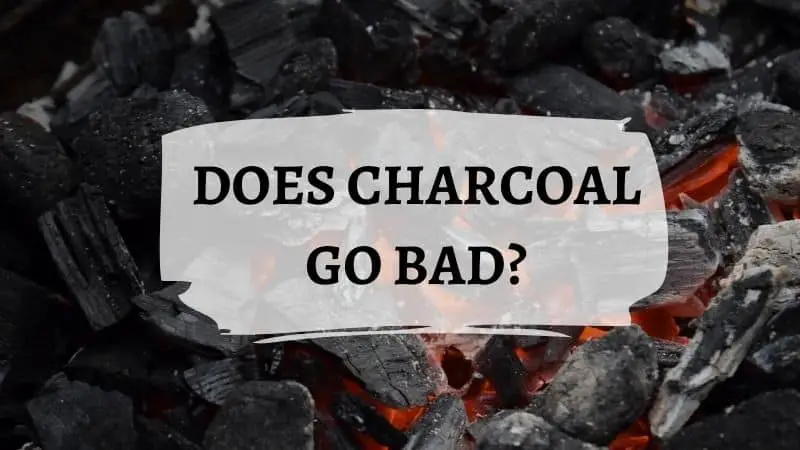Charcoal is a type of carbon that has been heated to high temperatures. It can be used as an ingredient in cooking, for barbecuing, and even as toothpaste. Because it’s made from wood, does charcoal go bad? The answer is yes; but the expiration date varies depending on what you’re using it for. Charcoal briquettes are generally good for about six months or so before they start to break down into smaller pieces and lose their ability to burn well.
If you would like your charcoal briquettes to last longer than six months, store them in a dry place with low humidity levels (less than 50%). Lump charcoal lasts much longer because its porous nature absorbs moisture more easily which helps protect it from breaking down. Lump charcoal should last over a year.
What is Charcoal?
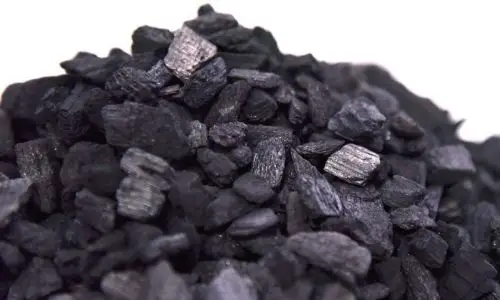
Charcoal is made from wood. It’s usually created by the process of pyrolysis, which involves heating up wood in a low-oxygen environment until it releases its chemical components and forms into charcoal. There are several kinds of charcoals. One kind comes from bamboo that has been burnt down to be used for grilling food over high heat. Another type is a “briquette”, which is a compressed mass of pieces of coal dust held together with wax or syrup to form a circular shape that can be broken apart easily when ready to burn.
In addition, you can purchase powdered charcoal meant for pet litter boxes. This type of charcoal is great at absorbing odors and moisture, making it ideal for the litter box.
Does Charcoal Go Bad?
When you find that your charcoal has a layer of dust on it, you may wonder if this means that it’s going bad. First of all, it means that the charcoal has been sitting around for a while and therefore isn’t as effective or useful as fresh charcoal would be. In fact, if you have too much old carbon in your garden soil, it can absorb water from nearby plants and prevent them from growing well.
However, don’t throw away your old lump of coal just yet! If the dust is minimal and you plan to use the charcoal soon to heat up some food on the grill or start up a fire in your fireplace to keep warm during those cold winter months ahead (and there’s nothing wrong with that!), then you can simply brush off the excess and reuse it as necessary.
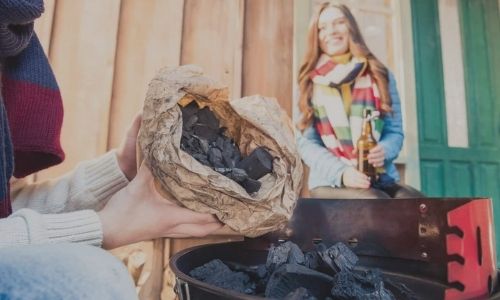
If you don’t plan on using the charcoal anytime soon, or if there’s a substantial amount of dust covering it, then it may be best to start looking for another source of fuel such as recycled wood pieces (which could still contain nails and glass, so be sure to watch out!).
To avoid wasting your time and money by buying new charcoal when your old charcoal no longer works for its original purpose, just remember that you should re-examine your old lump of coal every six months or so. If there’s a lot more dust than there used to be, then the charcoal is definitely going bad and isn’t worth keeping around anymore.
On the other hand, if the dust is minimal and can be brushed off with little effort, then your charcoal isn’t too far past its prime. Overall, there’s no right or wrong answer for how long charcoal lasts. How quickly it goes bad depends on several factors including exposure to air, moisture, heat and dirt.
Even so, most households only use bits of charcoal at a time for short periods of time (no longer than six months), so you should never have any trouble finishing off the rest before it starts to decompose.
Why My Charcoal Doesn’t Work Anymore
You may wonder what exactly causes old charcoal to “go bad.” Why doesn’t it work like it used to when you first it? One reason why your charcoal may not be working is because you can’t light it anymore. In this case, the problem could be that the coal doesn’t have enough surface area exposed to air during ignition.
If your charcoal contains a lot of dust from sitting around for a long time, then it’s possible that a breeze or a gust of wind blew some of the fine particles into areas where they don’t belong. Or maybe you were using lighter fluid instead of matches and your charcoal absorbed too much petroleum jelly to catch fire quickly and easily.
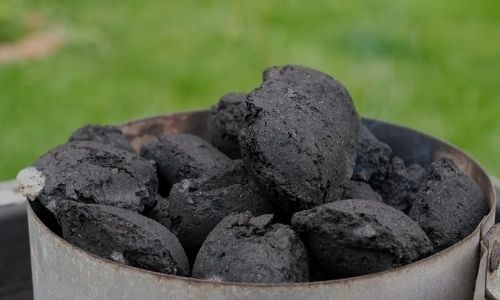
Another reason why your charcoal may no longer burn well is because air keeps getting in. This means that moisture keeps accumulating inside the bag or pouch in which you store it together with its original packaging so that all of the surfaces stay uniformly covered.
Even if you keep your charcoal in an airtight container, it can still contain small holes that leave room for air to seep in and dampen the coal’s surface. If this is the case, then you can try putting some water on top of the coal pieces (but not too much) before lighting them up so that they have a chance to dry out first.
If you dispense with this step and go straight for the fire anyway, then the wet particles will just smother all of those little coal lumps until none of them can catch fire quickly enough to provide any heat at all.
However, if your charcoal has been stored under optimal conditions but still won’t light no matter what you do, then it might be because there are foreign particles inside. Maybe some dirt or debris accumulated on your coal’s surface after being exposed to the elements for too long.
Or maybe you just picked up a bag of charcoal that was mislabeled and what you thought was actually usable higher-grade fuel turned out to be pure waste instead. Whatever the cause, if anything other than carbon is inside your lump of coal, then it won’t work like it should.
How Long Does Charcoal Last?
With all of this in mind, how long does charcoal last? Well, as mentioned earlier, there’s no hard and fast rule about when charcoal goes bad (or “expires”) because different households use different amounts at different times for extended periods of time. As a general estimate though, you can figure that charcoal will remain in optimal condition for about six months when stored under the right conditions.
Charcoal’s shelf life may be shorter or longer depending on your usage patterns and lifestyle. If you’re just using it to cook with once every couple of weeks, then one bag might last you several years without any problems whatsoever.
On the other hand, if you use it almost every day year-round in order to grill large amounts of food in preparation for major gatherings with friends and family members, then two bags will probably dry out in no more than six months after opening their respective packaging.
You should always store charcoal inside resealable containers (such as zipper lock back or an airtight container) to preserve the fuel’s high quality for as long as possible. Also, make sure that your charcoal is stored away from direct sunlight inside a dry place where the temperature stays between 60 and 80 degrees Fahrenheit year-round.
How to Keep Charcoal Fresh Longer
Charcoal goes stale and loses its effectiveness over time. It can be difficult to keep charcoal fresh, but there are several things you can do to increase the life of your charcoal and make it last longer. One important thing to remember is that if your charcoal smells like vinegar, or has a sour taste, it has spoiled and it cannot be used.
1) Store Your Charcoal in a Cool and Dry Place
It’s important for your charcoal to be kept as cool as possible; humidity should also not be an issue because this causes the production of mildew which gives off a horrible scent.
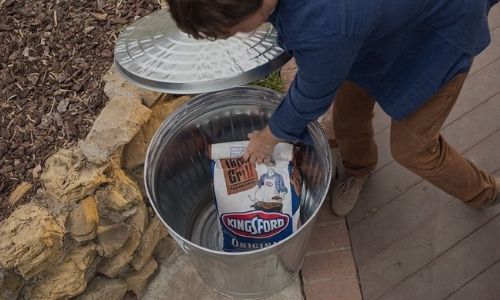
If you live in an area with high humidity you may want to consider storing your charcoal somewhere other than the original packaging (i.e., in a ziplock bag or air-tight jar) because it will reduce the risk of mildew.
It should also be stored in a dry place; this means you should make sure your cupboards aren’t water damaged, and that they are usually pretty clean since charcoal has a tendency to pick up odors from other substances that are stored nearby.
2) Don’t Let Your Charcoal Get Wet
Although charcoal is very resistant to moisture, it’s important to remember that prolonged exposure can cause its effects to wear off more quickly. This means you shouldn’t leave your charcoal sitting in water! If at all possible, keep your charcoal away from sources of water including humidity, rainfall/snowfall, seawater, etc., so this will help your charcoal to retain its freshness and effectiveness.
3) Buy Charcoal Before it Runs Out
If you want your charcoal to last as long as possible, it’s a good idea to buy an extra bag or box so you don’t run out unexpectedly right before a barbecue! If at all possible, try not to use up the entire thing at once — for example, if you’re barbecuing for 10 people but only need 14 briquettes (because some of them might be very small), then measure out about 7-10 instead. This will also help save you money because the rest will stay fresh until the next time you use it; this means that each time you cook with charcoal, there won’t be as big of a chance that the charcoal will expire and become unusable.
4) Replace Your Charcoal Often
Just like anything else, if you want something to last longer, it has to be replaced more often. Therefore, if you use your charcoal frequently (which doesn’t have to include every week), you should replace it at least yearly. If this isn’t possible because of budgetary constraints or time constraints for other reasons, then try replacing your charcoal every 2-3 months. This ensures that your charcoal won’t expire while sitting in storage and decrease its effectiveness by a big margin.
Overall, storing your charcoal properly can help you retain its freshness and effectiveness for a long period of time Remember not to keep it in humid areas, don’t let it get wet, buy charcoal before it runs out, and replace it often. Do all of these things together to keep your charcoal fresh for as long as possible.
Conclusion
So does charcoal go bad? Yes, it can, but there are several reasons why this might happen, with moisture being the main one. Fortunately, you can prevent your coal from spoiling through proper storage in an airtight container away from light. You should also use water on top of your coal before lighting it up so that the wet particles have time to absorb any additional air first before catching fire.
And finally, if you think your coal is already contaminated with something else, then it’s probably not usable anymore. But how long does charcoal last? Several months under the right conditions, but there are lots of factors that can play into its shelf life too.
